At the Aspen Institute Economic Opportunities Program, we believe that confronting the inequities that divide us along the lines of race, gender, ethnicity and geography, restoring the promise of work, and broadening opportunities to participate in business ownership are essential to building a more free, more just, and more equitable world. Below we share our monthly newsletter with highlights of recent work. As always, we welcome your feedback, thoughts, and partnership in advancing inclusive opportunity and an economy in which we all can thrive. Click here to subscribe.
Click here to view past editions of our newsletter
Upcoming Events
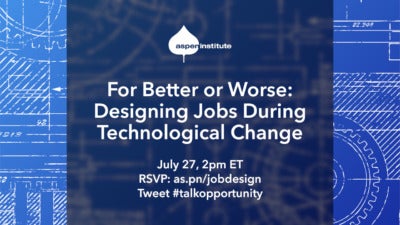
July 27 – For Better or Worse: Designing Jobs During Technological Change
Increased global competition in recent decades has unleashed a new wave of technological advancement, and a new wave of predictions of technological displacement and job loss. But job destruction is not a foregone conclusion of technological advancement; in complex systems outcomes are hard to predict. Technology can replace workers or make work less fulfilling, but it can also be used to complement workers’ skills and improve wages, safety, and employee engagement. Choices about developing and deploying technology and designing new jobs all make a difference.
Employers, workers, government, philanthropy and others can play an active role in shaping how technology is used, how jobs are designed, and what the future of work will be. How does technology affect job design? What can employers and businesses do to invest in technology and their workforce to improve business performance and increase employee retention and engagement? How can workers be engaged to help shape operations and how technology is developed and used? What can we learn from human-centered design?
Join us on Wednesday, July 27, at 2:00 p.m. EDT for a virtual discussion, “For Better or Worse: Designing Jobs During Technological Change.” This event features a panel discussion with Ben Armstrong (Work of the Future Initiative, MIT), Lisa Dewey-Mattia (Port Authority of New York & New Jersey), Becky Lee (IDEO San Francisco), moderator Danielle Abril (The Washington Post), and more speakers to be announced.
This is the first event in our three-part series on The Job Quality Choice: Opportunities and Challenges in Job Design. Join us to explore the drivers of job design, examine current challenges and opportunities around issues such as technology, skills development, and employee ownership, and discuss strategies and practices that create good jobs that help workers and businesses succeed together. Discussions include:
- For Better or Worse: Designing Jobs During Technological Change — July 27
- The Inequities of Skills Development in the Workplace: A Discussion on Designing Work-Based Learning — Date TBD
- Job Design and Employee Ownership — Date TBD
Registration will open soon for our second and third events. Join our Events mailing list to be notified when tickets are available.
Profiles of the Job Quality Fellows
We’re pleased to launch a new series of profiles on the 2022-23 Job Quality Fellows, to be released throughout the summer and fall. In our first issue, we look at Daniel Bustillo and Lindsay Blumer, who are prioritizing worker voice and equity in partnerships and advocacy for workforce development investments.
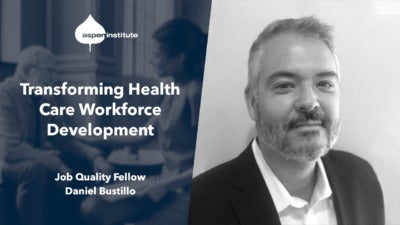
Transforming Health Care Workforce Development
“If we do not confront the links between systemic racism and sexism and the poor job quality that millions of caregivers experience each day, the United States will not solve the care crisis in the transformational way that older adults, people with disabilities, and the workers who care for them so urgently need.” — Daniel Bustillo, Executive Director, The Healthcare Career Advancement Program
TweetAs executive director of @HCAPinc, @daniel_bustillo works to “confront the links between systemic racism and sexism and the poor #jobquality that millions of caregivers experience each day.” Read more in this profile by @AspenJobQuality.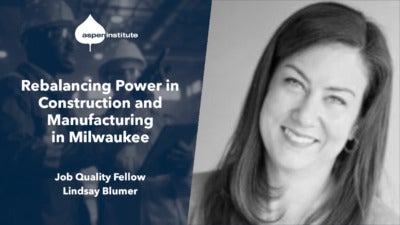
Rebalancing Power in Construction and Manufacturing in Milwaukee
“We boldly work toward building impactful connections between people and industry in innovative and equitable ways that reinforce the systems and tools that build America’s middle class.” — Lindsay Blumer, President and CEO, WRTP l BIG STEP
TweetAs a workforce intermediary with strong ties to workers, community, unions, and industry, @wrtpbigstep sits at the nexus of the #jobquality conversation. Read more in this profile of President and CEO Lindsay Blumer.
News and Updates

Video: How Tech is Changing Work
On June 2, Future of Work Initiative Director Shelly Steward spoke at the Smithsonian Arts + Industries Building on a panel about How Tech is Changing Work. What new technologies and trends are moving the needle on how and where we work? How can we continue to use workplace technologies to benefit employees’ overall wellbeing? This session explored how rising technologies and ideas — such as remote/teleworking, the four-day work week, virtual reality, and artificial intelligence — will transform the future of our workplaces. Steward spoke alongside Ben Armstrong (MIT), Allison Horn (Accenture), and Aman Kidwai (Fortune).
TweetHow can workplace technologies benefit employees’ wellbeing? Hear @shellysteward @AspenFutureWork, Ben Armstrong @MIT, @allisonhorn @Accenture, and Aman Kidwai @FortuneMagazine in conversation at @SmithsonianAIB.
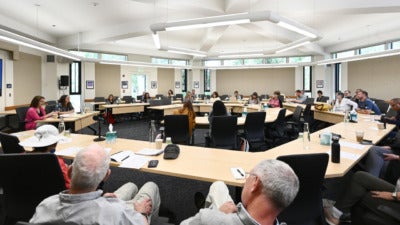
The Changing Nature of Work and Our Troubled Democracy: Two Sides of the Same Coin?
American jobs and American democracy are both in crisis. How does the nature of work influence how working people participate in civic and economic life? Can reimagining work put the nation on a better path? On June 28, EOP Executive Director Maureen Conway and Future of Work Initiative Director Shelly Steward led a discussion on “The Changing Nature of Work and Our Troubled Democracy: Two Sides of the Same Coin?” This event was convened as part of the 2022 Aspen Ideas Festival.
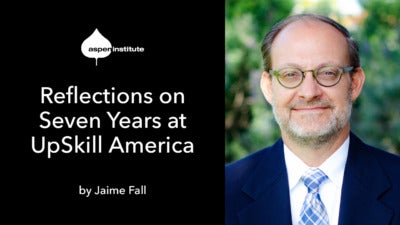
Updates from UpSkill America
In a new blog, Jaime Fall reflects on his seven years as director of UpSkill America, looking at what’s been accomplished and some of the work that remains as a new director steps in next month
TweetThe #upskilling movement has brought important changes to company-funded education and training programs — including making them more accessible, flexible, holistic, and relevant for participating employees.
In May, UpSkill America — in partnership with the Aspen Institute Latinos and Society Program — co-authored a report on “Pathways to digital skills development for Latino workers,” which shares insights from employers and workforce organizations. This month, as a follow-up, we released a newly designed excerpt from the publication, “10 Things We Learned About Digital Skills During the Pandemic,” as a standalone brief. Click here to download it.
In addition to sharing resources of our own, we also uplifted insights from leaders across the upskilling movement. In this interview, we hear from Jeffrey Connor-Naylor, director of Business Leaders United. Connor-Naylor discusses how business leaders can help to ensure that federal funding for digital equity supports skills training for workers using technology in the workplace. Read more.

A Standout Leader for a Landmark Moment
This month we congratulated EOP Advisory Council Member Liz Shuler on her election as president of the AFL-CIO – the first woman to hold this role – and Fred Redmond on his election as secretary-treasurer – the first African American in this role. Shuler first assumed the presidency by appointment of the AFL-CIO Executive Committee following the passing of Richard Trumka in 2021. It is inspiring to see the nation’s largest worker organization lifting up a new generation of leadership dedicated to working toward a more equitable economic future for America’s working people.
TweetCongrats to @AFLCIO President @LizShuler and Secretary-Treasurer @STRedmond! It’s inspiring to see the nation’s largest worker organization lift up a new generation of leadership dedicated to building a more equitable economic future.
Join the conversation
to join the conversation!
Join the Conversation
Follow EOP on social media to join the conversation!
— Job quality updates from EOP @AspenJobQuality
— Business Ownership Initiative @Aspen_BOI
— UpSkill America @upskillamerica
— Future of Work Initiative @AspenFutureWork
About EOP
The Aspen Institute Economic Opportunities Program (EOP) advances strategies, policies, and ideas to help low- and moderate-income people thrive in a changing economy. We recognize that race, gender, and place intersect with and intensify the challenge of economic inequality and we address these dynamics by advancing an inclusive vision of economic justice. For over 25 years, EOP has focused on expanding individuals’ opportunities to connect to quality work, start businesses, and build economic stability that provides the freedom to pursue opportunity. For more information, visit as.pn/eop.
EOP has several initiatives, including the Business Ownership Initiative, Workforce Strategies Initiative, UpSkill America, Good Companies/Good Jobs, and the Future of Work Initiative. In addition, across these approaches EOP hosts the Economic Opportunity Fellows Network and the Opportunity in America event series.
Thank you to our many partners and funders for supporting our efforts.
Support Our Work
We are committed to making our events and publications freely available to everyone who finds them useful. But if you find value in our work and are able to support it, please consider making a tax-deductible donation. Click here to learn more.
Keep in Touch
Click here to join our mailing list.
For updates every day, follow us on social media.

